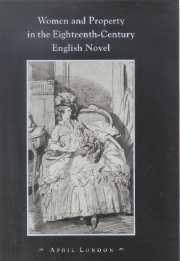Book contents
- Frontmatter
- Contents
- Acknowledgements
- Introduction
- PART I SAMUEL RICHARDSON AND GEORGIC
- Introduction
- 1 Clarissa and the georgic mode
- 2 Making meaning as constructive labor
- 3 Wicked confederacies
- 4 “The work of bodies”: reading, writing, and documents
- PART II PASTORAL
- PART III COMMUNITY AND CONFEDERACY
- PART IV THE POLITICS OF READING
- Epilogue
- Notes
- Bibliography
- Index
1 - Clarissa and the georgic mode
Published online by Cambridge University Press: 14 October 2009
- Frontmatter
- Contents
- Acknowledgements
- Introduction
- PART I SAMUEL RICHARDSON AND GEORGIC
- Introduction
- 1 Clarissa and the georgic mode
- 2 Making meaning as constructive labor
- 3 Wicked confederacies
- 4 “The work of bodies”: reading, writing, and documents
- PART II PASTORAL
- PART III COMMUNITY AND CONFEDERACY
- PART IV THE POLITICS OF READING
- Epilogue
- Notes
- Bibliography
- Index
Summary
From the beginning of the novel, Clarissa's relation to property is represented figuratively, in the sense of those qualities she possesses as an individual, and literally, in the estate she has inherited from her grandfather. The terms of the grandfather's bequest make clear his commitment to a conservative understanding of property; for him, land confers dignity on and grants agency to its possessor. The will establishes that she may at eighteen leave the “great part of his estate to whom she pleases of the family, and the rest of it (if she die single) at her own discretion”. His motive is “to create respect for her” as a shield against the envy that her goodness may attract. His action expresses faith in her possession of a virtue that is not compelled or expedient, but innate and constructive. The note detailing the events leading to the inheritance suggests, moreover, that during his lifetime the grandfather secured his title to her time by publicly expressing the value of her labor: “ in order to invite her to him as often as her other friends would spare her, [he] indulged her in erecting and fitting-up a dairy-house in her own taste. When finished, it was so much admired for its elegant simplicity and convenience that the whole seat, before of old time from its situation called The Grove, was generally known by the name of The Dairy-house” (41).
- Type
- Chapter
- Information
- Publisher: Cambridge University PressPrint publication year: 1999

